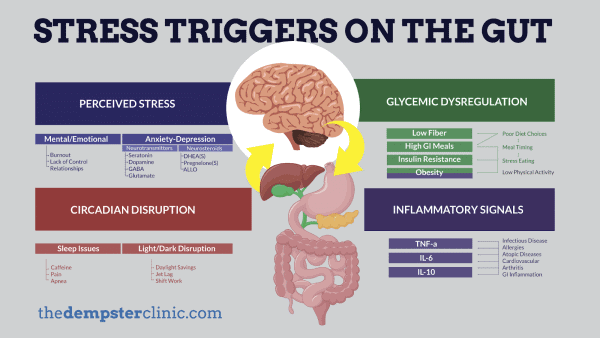These days, it’s almost expected that you’ll deal with fatigue. Nearly 30 percent of Canadians report going to work feeling tired, and an estimated 20 percent of car accidents cite fatigue as a factor. Not only does exhaustion compromise your driving skills and work output, but it also affects your quality of life. Worst of all, feeling like you’re passing through the hours in an exhausted stupor is often a sign that something more serious could be wrong.
As a father of a four-month-old baby, I can tell you that my wife and I are experiencing first hand what it’s like to deal with exhaustion on a daily basis. If you’re sick of feeling like you could fall asleep at any moment, it’s important to look closer at your health to see what the problem may be.
10 Unexpected Causes of Exhaustion
What’s the cause of your fatigue? Beyond the obvious factor of failing to get to bed on time, here are some reasons why your energy levels may be flagging throughout the day.
1. You Have Depression

Depression is a health condition caused by abnormalities in your neurotransmitters, which are the chemicals that regulate your mood. This lack of balance can lead to sleep problems that keep you awake, cause you to struggle to fall asleep, or make it difficult to wake up on time in the morning. For these reasons, people with depression often feel sluggish and unmotivated throughout the day. If not addressed, this exhaustion can lead to debilitating fatigue.
2. You Eat a Poor Diet
Food is fuel, and the quality of your diet has a significant effect on your energy levels each day. If you fail to eat a nutrient-dense, balanced diet, you’re likely to feel inexplicably tired. Sugar consumption is an especially dangerous threat, as it temporarily elevates your blood pressure, only to cause it to crash down again soon after and leave you feeling more depleted than before.
The best way to improve your health and eliminate fatigue is to fill up on fruits and vegetables at every meal while making sure that hearty whole grains make up at least half the carbohydrates you consume.

3. You Have Low Iron Levels
Keeping iron in your diet is critical for reducing your risk of developing anemia, a condition where your body has a lower than the desired amount of red blood cells. It can also be caused by not having enough hemoglobin, the substance that carries oxygen through your body and makes red blood cells red. Too little hemoglobin or red blood cells makes your body run on an oxygen deficit that leaves you feeling dizzy, short of breath, and suffering from headaches. Over time, low iron can lead to chronic fatigue. If you think your levels are low, consider taking a supplement to restore it.
4. You Live a Sedentary Lifestyle

It might sound counterintuitive, but not getting exercise will leave you feeling more exhausted than if you dedicated your time to breaking a sweat. Research from the University of Georgia found that participants who sat still had less energy than those who completed moderate-intensity exercise for twenty minutes. There’s no excuse for not fitting this amount of movement into your day, so get exercising and watch your mood and energy levels perk up. A brisk walk can make a difference, but you’ll get more benefits from something more aerobically challenging, like a cardio workout. You can take things even further by completing a gentle stretching routine after to loosen your limbs and prevent injuries.
5. You Have a Nutrient Deficiency
Feeling fatigued for no discernable reason might be a sign of an undiagnosed nutrient deficiency. A healthy variety of vitamins and minerals are critical for everything from developing strong bones to optimal brain functioning. Shortages of critical compounds like magnesium, potassium, vitamin B12, and many other can trigger full-body fatigue, no matter how much you rest.
As these deficiencies can lead to far more serious problems than fatigue, it’s important to get your mineral levels tested if you suspect your levels are low.
6. You Have Sleep Apnea
If you go to bed at a reasonable hour each night but wake up feeling exhausted, the problem may be sleep apnea. This chronic condition causes you to take shallow breaths throughout the night or even stop breathing altogether for anywhere from a few seconds to a minute at a time. Sometimes these pauses in breath happen thirty times within a minute, and each time they force your body partly awake in a process that disrupts your sleep. This lack of quality rest often leads to daytime exhaustion, morning headaches, concentration problems, irritability, and depression.
Since it’s often impossible to notice your personal sleep apnea, you will need to make an appointment with a functional medicine specialist to learn if that’s causing your problems. Be sure to book that appointment right away, as undiagnosed sleep apnea can lead to heart problems, strokes, and even death.
7. You Have Excessive Stress
It’s hard to avoid stress these days. From work problems to family issues, there’s a lot to keep you up at night- so it’s no surprise that stress is a leading cause of low sleep quality. Low levels of stress can enhance your alertness by boosting your adrenaline levels, which makes it harder to fall asleep at night. This also contributes to a feeling that you’re always on edge, and it can lead to migraines and tense muscles, especially in the back and shoulders. You can calm down your mind by following these tips.
– Identify the source of your stress by keeping a stress journal to track what triggers you.
– Practice saying no when you feel exhausted and over-committed.
– Stay away from the people and situations that most stress you out.
– Communicate your concerns when you feel them, rather than bottling them up.
– Change your perspective on a stressful situation to strive to see the positive.
– Look at the big picture to gain perspective on the risks of what’s stressing you out.
– Accept what is outside your control and stop striving to change it.
Smart ways to lower your stress levels include getting exercise and talking things over with a trusted friend. Your problems will soon be put into perspective, and you’ll regain some of the energy that’s been devoted to worrying.
Stress is also bad for your digestive system, as you can see below.

8. You Have Chronic Fatigue Syndrome
For situations where your exhaustion seems inexplicable, the problem could be chronic fatigue syndrome. This disorder is characterized by debilitating exhaustion that doesn’t improve from resting, and the causes of the condition are still unknown. Signs you have chronic fatigue syndrome include struggling to get out of bed each day, impaired short-term memory or concentration abilities, experiencing frequent headaches, and having a sore throat, tender lymph nodes, or joint pain.
While doctors don’t know what triggers the condition, there are steps they can help you take to help you restore your energy levels. Make an appointment today if you want to find relief.
9. You Drink Too Much Caffeine
While most of us turn to cups of coffee to boost our energy level, it’s possible to take too much and find your energy falling instead. For instance, taking caffeine too late in the day can upset your circadian rhythm, impact your sleep quality, and prevent you from feeling well rested the next day in a vicious cycle of exhaustion. Likewise, a caffeine addiction inevitably leads to caffeine withdrawals, which can leave you with less energy in the long run. This means that going without coffee for a day if you’re used to a cup (or four) can leave you feeling exhausted.
So, what’s the solution? There are many ways to boost your energy without turning to this tricky brew, including drinking green tea, protein shakes, or even plain water. Your hydration levels are also closely connected with overall energy, so find other ways to replenish your water levels than a cup of coffee.

10. You Have an Underactive Thyroid
Your thyroid controls your metabolism, meaning that any compromises in its functionality can lead to problems with your energy levels. Hypothyroidism, a medical condition where your thyroid gland doesn’t produce enough of the right hormones can lead to symptoms similar to depression, including low energy and weight gain. Thankfully, a simple blood test can determine whether your thyroid is functioning well, so make an appointment to find out the facts for yourself.
Discovering The Bottom Line Behind Your Exhaustion
So what’s the real reason you’re so tired all the time? I wish there were one easy answer. In truth though, your exhaustion is likely a combination of these factors, compounded with other variables that are unique to your life. While it isn’t easy to diagnose the reasons behind your reduced energy, the good news is that it’s possible to enhance your energy levels and improve your quality of life.
If you’re not sure where to start, I invite you to make an appointment at my clinic. At The Dempster Clinic- Center for Functional Medicine, I can work with you to analyse your lifestyle and see what might be a contributing factor to your fatigue, and how you can regain control over it.
I am pleased to offer a Complimentary 15-minute Discovery Session for all potential patients. This session can take place over the phone or at the clinic in person. It provides an opportunity for you to learn more about the services I offer and how they can be of benefit to you.
Please schedule an appointment today! Your best health awaits.
Dr. John Dempster BSc., ND, FAAFM
The Dempster Clinic- Center for Functional Medicine

